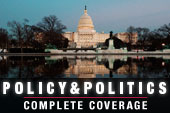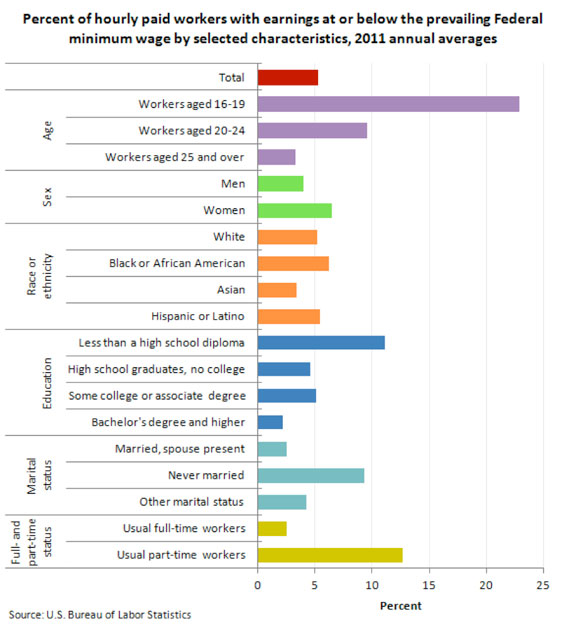The issue that seems to have gotten the most attention in Barack Obama’s State of the Union Address on Tuesday is his proposal to raise the minimum wage to $9 per hour from $7.25. The knee-jerk conservative reaction is to say that a higher minimum wage will reduce jobs. Conservatives have always made this argument and it has always failed to stop the minimum wage from rising.

Liberals argue that academic research shows that modest increases in the minimum wage have a minimal impact on jobs, while doing a lot to raise the incomes of the working poor.
At a time of high unemployment, it may appear that conservatives have the stronger argument. However, their problem, politically, is that the loss of jobs due to a higher minimum wage comes almost exclusively from the loss of jobs that otherwise would be created. That is, from the loss of jobs that do not now exist, but would come into existence at a lower minimum wage.
It is almost unheard of for employers to fire workers rather than pay them a higher minimum wage. They may not fill vacancies, they may adjust hours, they may move toward automation, they may scale back benefits and many other things. But firing workers is not one of them.

This creates a political problem for minimum wage opponents. Those who will benefit from a higher minimum wage know exactly who they are and almost to the dollar exactly how much they will benefit. Those that are unable to get jobs in the future will have no idea that it is because they were priced out of work by a higher minimum wage.
This is the key reason why there is overwhelming support for raising the minimum wage in every poll. Historically, three-quarters of people have approved of a higher minimum wage, including among Republicans.
The latest polling is from a year ago by Lake Research, a Democratic firm. Overall, 73 percent support raising the minimum wage and only 20 percent were opposed. This margin held pretty much regardless of demographic characteristic, with the except among Republican men, who were opposed by a 51 percent to 43 percent margin. Republican women, however, supported an increase by a 58 percent to 30 percent margin.
Even when people were told, specifically, that an increase in the minimum wage might lead to a loss in jobs, it had almost no impact on support. The contrary argument that raising the incomes of the working poor would increase the demand for goods and services, and hence raise growth and jobs, was more compelling.
Needless to say, a higher minimum wage resonates strongly with the Democratic Party’s base, especially minorities. Of particular interest to Republicans, who are striving to reach out to the fast-growing Latino community by toning down their opposition to immigration reform is that Latinos support a higher minimum wage by an 85 percent to 12 percent margin.
Thus, politically, supporting a higher minimum wage is a no-brainer for Democrats. In fact, the last time it was a political issue, during the 2006 campaign, it was a major factor in Democratic gains, helping them take control of Congress. Democratic insiders believe it could help them do the same in 2014. This suggests that the optimum Republican strategy is not to fight a minimum wage increase to the death, but rather to raise questions about how it is implemented and perhaps offer amendments that will diminish Democratic support.
One might wonder, who works for nothing? The answer is interns. Internships have become increasingly important as businesses seek to cut labor costs and also to see a potential employee in action before offering him or her a paying position. In many businesses, it is virtually impossible to get a starting position without having served an internship.
An amendment to expand coverage of the minimum wage to internships might be viewed by some minimum wage supporters as a “killer amendment” as businesses such media companies that are heavily dependent on interns are threatened. If the goal is to make the minimum wage less onerous for employers, one idea would be to give them credit for benefits given to employees. Presently, the minimum wages applies to cash wages only; health or other noncash benefits count for nothing under the law.
One obvious effect of this rule is that businesses employing minimum wage workers have no incentive to offer health benefits. Yet it is obvious that health insurance has great value to many workers and some might be willing to work for just that. Given the Obama administration’s goal of expanding health coverage, it would make sense to encourage businesses to offer it to their minimum wage workers by giving them credit for the dollar value of health insurance under the minimum wage.
Another thing that conservatives may want to think about is the impact of the minimum wage on immigration. Peter Coy of Bloomberg Businessweek suggests that a higher minimum wage would encourage hiring of the native-born and legal immigrants over those here illegally.
Indeed, it is not now remembered, but one of the key motives for imposing a minimum wage in the first place was to keep out low-wage immigrants and prevent a race to the bottom in which they dragged down the wages of native born workers, according to the Princeton economist Thomas Leonard. This goal was shared by those on both the left and the right.
In a head-to-head fight with Democrats on raising the minimum wage, Republicans will lose. They may temporarily block an increase, but they will pay dearly in next year’s congressional elections. They will be seen, once again, as being in the pockets of the rich against the interests of working people. It would be better for Republicans to devise a more sophisticated strategy to minimize the impact on jobs without scorched-earth opposition, which is a loser.






